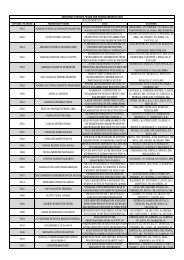immunology of infectious and parasitic diseases - XXXVII Congress ...
immunology of infectious and parasitic diseases - XXXVII Congress ...
immunology of infectious and parasitic diseases - XXXVII Congress ...
You also want an ePaper? Increase the reach of your titles
YUMPU automatically turns print PDFs into web optimized ePapers that Google loves.
EFFECT OF THALIDOMIDE TREATMENT ON IMMUNE RESPONSE<br />
AGAINST BRUCELLA ABORTUS<br />
MARINA COELHO DE QUEIROZ (1) ; CAROLINA DE SOUZA MIRANDA (1) ;<br />
MARCELA MOTA (1) ; TÁRSILA GUIMARÃES (1) ; GILSON COSTA MACEDO (1) .<br />
(1) Laboratório de Imunologia, Departamento de Parasitologia, Microbiologia e<br />
Imunologia, Instituto de Ciências Biológicas, Universidade Federal de Juiz de<br />
Fora, Juiz de Fora – MG, Brasil.<br />
Introduction: Brucellosis is a zoonosis caused by bacteria <strong>of</strong> the genus<br />
Brucella that infects humans <strong>and</strong> a variety <strong>of</strong> animals, mainly cattle. According<br />
to World Health Organization, this illness remains the commonest zoonotic<br />
disease worldwide with thous<strong>and</strong>s <strong>of</strong> new cases reported every year. In addition<br />
to great damages to health, Brucellosis affects the quality <strong>of</strong> animal-derived<br />
products resulting in a great economic impact, especially in Brazil. The immune<br />
response against Brucella involves several mechanisms <strong>of</strong> innate <strong>and</strong> acquired<br />
immunity, <strong>of</strong> which the cytokine IFN- <strong>and</strong> CD8 + T cells have a critical role. In<br />
this context, many studies have shown that Thalidomide (a glutamic acid<br />
derivative) is able to induce high production <strong>of</strong> IFN-, costimulation, proliferation<br />
<strong>and</strong> cytokine production, mainly by CD8 + T lymphocytes. Thus, the goal <strong>of</strong> this<br />
study was evaluate the effect <strong>of</strong> Thalidomide treatment on immune response<br />
against B. abortus.<br />
Methods <strong>and</strong> Results: The C57BL/6 mice were treated with Thalidomide<br />
during seven days <strong>and</strong> infected with B. abortus (S2308). The PBS treated mice<br />
were used as control. A week after the infection, the bacterial load was<br />
determined in the spleen. IFN- <strong>and</strong> Nitric oxide (NO) production were<br />
evaluated in supernatants <strong>of</strong> splenocytes in response to B. abortus stimulation.<br />
Cytokine (IFN- e IL-12) concentration was also evaluated in macerated liver.<br />
Finally, the ability <strong>of</strong> B. abortus-primed splenocytes from Thalidomide treated<br />
mice, to lyse infected macrophages was assayed.<br />
The results have shown a significant decrease in the number <strong>of</strong> bacteria in the<br />
spleen <strong>of</strong> the treated animals compared to control group. Furthermore, the<br />
treated group showed greater IFN-, IL-12 <strong>and</strong> NO production in response to<br />
Brucella. Additionally, was detected an enhanced cytotoxic activity in<br />
splenocytes derived from treated animals.<br />
Conclusion: The results suggest that Thalidomide is able to potentiate the<br />
immune response against B. abortus.<br />
Financial Support: CNPq e FAPEMIG



